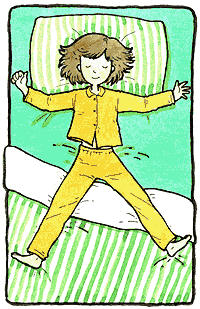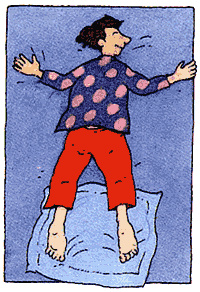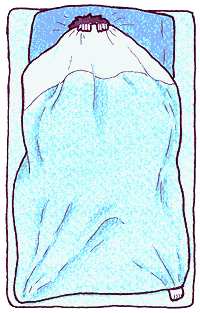 Have you ever gone to bed worried or angry and awakened feeling better about your circumstance? How about going to sleep while working on a project and waking with the answer in mind? In recent years it has come to light that sleep is restorative for more than just your body and mind. REM sleep (the stage of sleep when you dream and your eyes twitch back and forth) is actually important for your emotional health.
Have you ever gone to bed worried or angry and awakened feeling better about your circumstance? How about going to sleep while working on a project and waking with the answer in mind? In recent years it has come to light that sleep is restorative for more than just your body and mind. REM sleep (the stage of sleep when you dream and your eyes twitch back and forth) is actually important for your emotional health.I'm not talking about how rest improves mental health (although that's true too!) But we've heard that before. I'm talking about cutting edge research that suggests that sleep is needed to help your mind deal with your experiences. Psychologists and scientists alike believe that sleep "reorders" your feelings when you can't. It files them and categorizes them and makes sense of them. When you sleep, your brain is acutally doing important psychological work- and you get to sleep through it.

Once we realize that our brain is working hard all night- dreams begin to make more sense. They are (quite literally) pictures that represent emotions*. Most of the time the pictures are rather mundane housekeeping items. The represent nothing more than hum-drum mental filing. But every now and then we become plagued by repetitive or disturbing dreams and we can't shake them.
Dream analysis has been practiced perhaps forever. Since the dawn of man, we have struggled to make sense of what our mind does while we sleep. Kings often looked to dream interpreters to help them predict the future. Sometimes dreams were considered supernatural messages.
Modern dream understanding is less ethereal, but (I think) much more interesting! If dreams are nothing more than pictures which represent feelings, then our repetitive or bothersome dreams are simply HUGE METAPHORS. It's our mind sending up a flag to say, "Hello! Pay attention to this! You have an issue here!"
 Let me give you an example: I once had a fish that I (sadly) knocked out of its bowl and didn't realize it for a while. The fish survived but I was quite upset by the image of my dear pet flopping and gasping for water. For years after, I would have (seemingly) random fish dreams. I know, its strange. But its a dream! The scenarios and settings differed, but in the dream I was always anxiety-ridden and searching for water for my fish.
Let me give you an example: I once had a fish that I (sadly) knocked out of its bowl and didn't realize it for a while. The fish survived but I was quite upset by the image of my dear pet flopping and gasping for water. For years after, I would have (seemingly) random fish dreams. I know, its strange. But its a dream! The scenarios and settings differed, but in the dream I was always anxiety-ridden and searching for water for my fish.I mostly dismissed these dreams until they became more frequent and upsetting. They finally had my attention. So I gave it some thought. I contemplated how I was feeling about life- what my stressors were. When that didn't work I thought about metaphors having to do with fish:
 "Let's see... fish, water, can't breathe, gasping for air..... 'Fish out of water'!" Yup... the metaphor was GLARINGLY obvious. How could I have missed it? I had the dream because I was going through a time where I felt lost and out of place. I felt like I didn't belong and a sense of being out of my element. Additionally, I felt anxious and out of control of the situation- and I hadn't even given it much thought until my dream brought it to my attention!
"Let's see... fish, water, can't breathe, gasping for air..... 'Fish out of water'!" Yup... the metaphor was GLARINGLY obvious. How could I have missed it? I had the dream because I was going through a time where I felt lost and out of place. I felt like I didn't belong and a sense of being out of my element. Additionally, I felt anxious and out of control of the situation- and I hadn't even given it much thought until my dream brought it to my attention!Once I pinpointed the emotion, and began making positive changes in my life, the dreams went away as quickly as they had come.
So, my point is- sleep is good for more than the body. It can help regulate emotions and (sometimes) point us to address emotions we were unaware of. It allows us to categorize and make emotional sense of our experiences and feelings. In fact, what is blissful unconsciousness for us, is arguably when your brain works the hardest! So respect your bodies need for sleep. It is likely still more important than we realize.
And with that, I'm headed to enjoy my own sleep.
Krysta
*I cannot take credit for that term. A good friend of mine used it today. I liked it, so I stole it!






